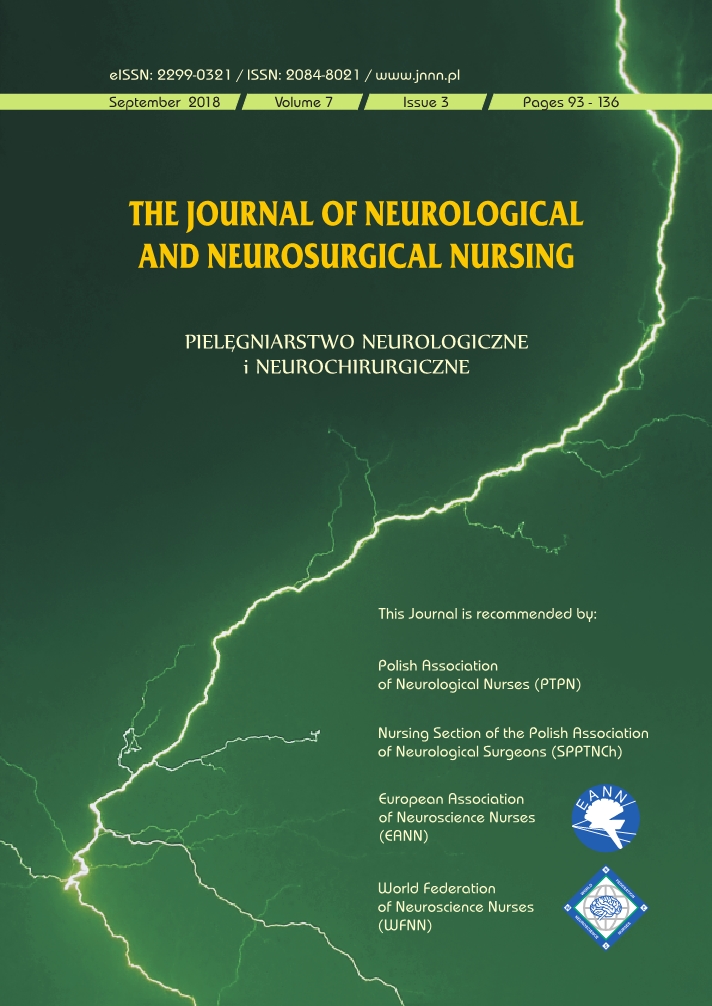Teoretyczna koncepcja wpływu Tai Chi na upadki wśród pacjentów z chorobą Parkinsona
DOI:
https://doi.org/10.15225/PNN.2018.7.3.6Słowa kluczowe
choroba Parkinsona, upadki, Tai ChiAbstrakt
Wstęp. Obecnie w Polsce i w innych krajach europejskich jesteśmy świadkami wzrostu ilości ludzi w podeszłym wieku. Szczególne znaczenie ma ocena psychofizyczna chorego oraz określenie deficytów jego funkcjonowaniu w życiu codziennym.
Cel. Celem pracy była analiza wybranych czynników demograficznych mających wpływ na funkcjonowanie biopsychospołeczne pacjentów neurogeriatrycznych.
Materiał i metody. Badania przeprowadzono w Klinice Geriatrii Szpitala Uniwersyteckiego nr 1 im. dr. A. Jurasza w Bydgoszczy na grupie 122 pacjentów w wieku od 60. do 95. roku życia, hospitalizowanych z powodu schorzeń układu nerwowego. Oceny biopsychospołecznej dokonano za pomocą skali NOSGER (Nurses’ Observation Scale for Geriatric Patients) — Pielęgniarskiej Skali Obserwacji Pacjentów Geriatrycznych oraz skali Barthel.
Wyniki. W wyniku przeprowadzonej analizy stwierdzono, że średnia ocena funkcjonowania osób starszych w ocenie skali NOSGER wyniosła 89,89 na 150 pkt maksymalnych. W wyniku przeprowadzonej analizy stwierdzono, że ankietowani w wieku do 64 lat najlepiej funkcjonowali w poszczególnych aspektach skali NOSGER, natomiast najgorzej funkcjonowali badani w wieku powyżej 90. lat z wyjątkiem podskali nastroje i emocje. W grupie wiekowej 65–74 lata i 75–89 lat funkcjonowanie było zbliżone we wszystkich podskalach. Przeprowadzona analiza statystyczna wykazała, że ankietowani, którzy byli w II grupie sprawności mieli istotnie gorsze funkcjonowanie w poszczególnych podskalach oraz ogólnej ocenie NOSGER niż badani, którzy byli w I grupie sprawności (p<0,05).
Wnioski. Nie stwierdzono różnic istotnych statystycznie pomiędzy płcią, wiekiem, stanem cywilnym i wykształceniem a sprawnością czynnościową pacjentów w ocenie skalą Barthel. Nie stwierdzono również istotnego wpływu płci, wieku i wykształcenia na ocenę pacjentów w skali NOSGER. Stwierdzono istotny wpływ stanu cywilnego na ocenę w obszarze zachowań destrukcyjnych i zakłócających w skali NOSGER. (PNN 2018;7(3):118–123)
Bibliografia
Parkinson’s Disease Foundation. Statistics on Parkinson’s. Retrieved January 2, 2018, from http://www.parkinson.org/Understanding-Parkinsons/Causes-and-Statistics/Statistics.
Allen N.E., Schwarzel A.K., Canning C.G. Recurrent falls in Parkinson’s disease: a systematic review. Parkinsons Dis. 2013;2013:906274.
Scianni A. Tai Chi improves balance and prevents falls in people with Parkinson’s disease. J Physiother. 2015;61(1):44.
Abbott R.B., Hui K.K., Hays R.D., Li M.D., Pan T. A randomized controlled trial of tai chi for tension headaches. Evid Based Complement Alternat Med. 2007;4(1):107–113.
Wood B.H., Bilclough J.A., Bowron A., Walker R.W. Incidence and prediction of falls in Parkinson’s disease: a prospective multidisciplinary study. J Neurol Neurosurg Psychiatry. 2002;72(6):721–725.
Canning C.G., Sherrington C., Lord S.R. et al. Exercise for falls prevention in Parkinson disease: a randomized controlled trial. Neurology. 2015;84(3):304–312.
Chen Y.K. Tai-Chi Ch’uan. Wildside Press LLC, 2003.
Zhongwen F., Swaim L. Mastering Yang Style Taijiquan. CA: Frog/Blue Snake Books, Berkeley 2006.
Mackenzie L., Byles J., D’Este C. Validation of self-reported fall events in intervention studies. Clin Rehabil. 2006;20(4):331–339.
Whiting W.C., Rugg S. Dynatomy: Dynamic human anatomy. Leeds: Human Kinetics, United States of America 2012.
Krebs D.E., Goldvasser D., Lockert J.D., Portney L.G., Gill-Body K.M. Is base of support greater in unsteady gait? Phys Ther. 2002;82(2):138–147.
Reed P. NURS706: Theory Development and Evaluation. Retrieved January 4, 2018, from https://m.arizona.edu/default/catalog/detail?term=2181&area=NURS&course=024844.
Choi H.J., Garber C.E., Jun T.W., Jin Y.S., Chung S.J., Kang H.J. Therapeutic effects of tai chi in patients with Parkinson’s disease. ISRN Neurol. 2013;2013:548240.
Goodwin V.A., Richards S.H., Henley W., Ewings P., Taylor A.H., Campbell J.L. An exercise intervention to prevent falls in people with Parkinson’s disease: a pragmatic randomised controlled trial. J Neurol Neurosurg Psychiatry. 2011;82(11):1232–1238.
Ashburn A., Stack E., Ballinger C., Fazakarley L., Fitton C. The circumstances of falls among people with Parkinson’s disease and the use of Falls Diaries to facilitate reporting. Disabil Rehabil. 2008;30(16):1205–1212.
Tsang W.W. Tai Chi training is effective in reducing balance impairments and falls in patients with Parkinson’s disease. J Physiother. 2013;59(1):55.
Walker L.O., Avant K.C. Strategies for theory construction in nursing. 5th Edition. Person Education, United States of America 2011.
van der Kolk N.M., King L.A. Effects of exercise on mobility in people with Parkinson’s disease. Mov Disord. 2013;28(11):1587–1596.
Pobrania
Opublikowane
Jak cytować
Numer
Dział
Licencja

Utwór dostępny jest na licencji Creative Commons Uznanie autorstwa – Bez utworów zależnych 4.0 Międzynarodowe.
Statystyki
Liczba wyświetleń i pobrań: 257
Liczba cytowań: 0
